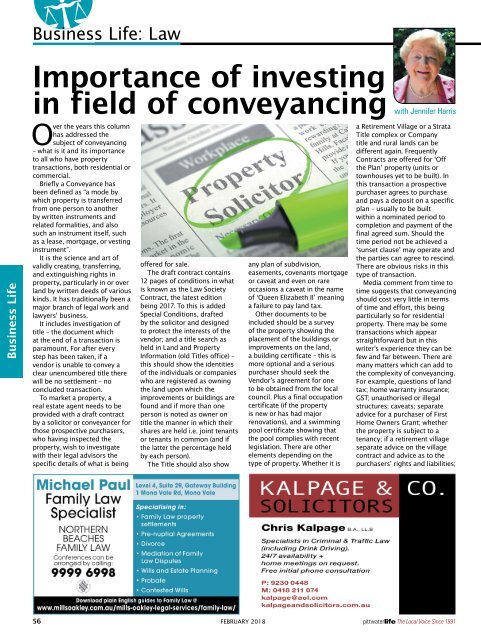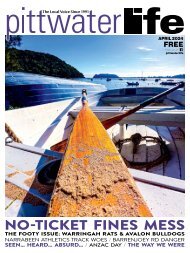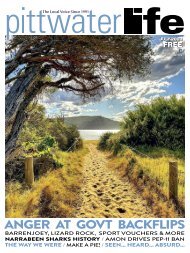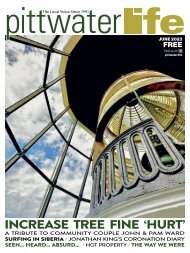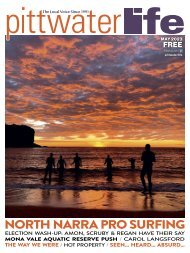Pittwater Life February 2018 Issue
Lap Land - Our Ocean Pools & The People Who Use Them. Busy Saving the Planet. Are You Connected? Robo Surf.
Lap Land - Our Ocean Pools & The People Who Use Them. Busy Saving the Planet. Are You Connected? Robo Surf.
Create successful ePaper yourself
Turn your PDF publications into a flip-book with our unique Google optimized e-Paper software.
Business <strong>Life</strong>: Law<br />
Business <strong>Life</strong><br />
Importance of investing<br />
in field of conveyancing<br />
Over the years this column<br />
has addressed the<br />
subject of conveyancing<br />
– what is it and its importance<br />
to all who have property<br />
transactions, both residential or<br />
commercial.<br />
Briefly a Conveyance has<br />
been defined as “a mode by<br />
which property is transferred<br />
from one person to another<br />
by written instruments and<br />
related formalities, and also<br />
such an instrument itself, such<br />
as a lease, mortgage, or vesting<br />
instrument”.<br />
It is the science and art of<br />
validly creating, transferring,<br />
and extinguishing rights in<br />
property, particularly in or over<br />
land by written deeds of various<br />
kinds. It has traditionally been a<br />
major branch of legal work and<br />
lawyers’ business.<br />
It includes investigation of<br />
title – the document which<br />
at the end of a transaction is<br />
paramount. For after every<br />
step has been taken, if a<br />
vendor is unable to convey a<br />
clear unencumbered title there<br />
will be no settlement – no<br />
concluded transaction.<br />
To market a property, a<br />
real estate agent needs to be<br />
provided with a draft contract<br />
by a solicitor or conveyancer for<br />
those prospective purchasers,<br />
who having inspected the<br />
property, wish to investigate<br />
with their legal advisors the<br />
specific details of what is being<br />
offered for sale.<br />
The draft contract contains<br />
12 pages of conditions in what<br />
is known as the Law Society<br />
Contract, the latest edition<br />
being 2017. To this is added<br />
Special Conditions, drafted<br />
by the solicitor and designed<br />
to protect the interests of the<br />
vendor; and a title search as<br />
held in Land and Property<br />
Information (old Titles office) –<br />
this should show the identities<br />
of the individuals or companies<br />
who are registered as owning<br />
the land upon which the<br />
improvements or buildings are<br />
found and if more than one<br />
person is noted as owner on<br />
title the manner in which their<br />
shares are held i.e. joint tenants<br />
or tenants in common (and if<br />
the latter the percentage held<br />
by each person).<br />
The Title should also show<br />
any plan of subdivision,<br />
easements, covenants mortgage<br />
or caveat and even on rare<br />
occasions a caveat in the name<br />
of ‘Queen Elizabeth II’ meaning<br />
a failure to pay land tax.<br />
Other documents to be<br />
included should be a survey<br />
of the property showing the<br />
placement of the buildings or<br />
improvements on the land,<br />
a building certificate – this is<br />
more optional and a serious<br />
purchaser should seek the<br />
Vendor’s agreement for one<br />
to be obtained from the local<br />
council. Plus a final occupation<br />
certificate (if the property<br />
is new or has had major<br />
renovations), and a swimming<br />
pool certificate showing that<br />
the pool complies with recent<br />
legislation. There are other<br />
elements depending on the<br />
type of property. Whether it is<br />
with Jennifer Harris<br />
a Retirement Village or a Strata<br />
Title complex or Company<br />
title and rural lands can be<br />
different again. Frequently<br />
Contracts are offered for ‘Off<br />
the Plan’ property (units or<br />
townhouses yet to be built). In<br />
this transaction a prospective<br />
purchaser agrees to purchase<br />
and pays a deposit on a specific<br />
plan – usually to be built<br />
within a nominated period to<br />
completion and payment of the<br />
final agreed sum. Should the<br />
time period not be achieved a<br />
‘sunset clause’ may operate and<br />
the parties can agree to rescind.<br />
There are obvious risks in this<br />
type of transaction.<br />
Media comment from time to<br />
time suggests that conveyancing<br />
should cost very little in terms<br />
of time and effort, this being<br />
particularly so for residential<br />
property. There may be some<br />
transactions which appear<br />
straightforward but in this<br />
writer’s experience they can be<br />
few and far between. There are<br />
many matters which can add to<br />
the complexity of conveyancing.<br />
For example, questions of land<br />
tax; home warranty insurance;<br />
GST; unauthorised or illegal<br />
structures; caveats; separate<br />
advice for a purchaser of First<br />
Home Owners Grant; whether<br />
the property is subject to a<br />
tenancy; if a retirement village<br />
separate advice on the village<br />
contract and advice as to the<br />
purchasers’ rights and liabilities;<br />
56 FEBRUARY <strong>2018</strong><br />
The Local Voice Since 1991


